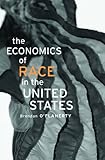The economics of race in the United States /Brendan O'Flaherty.
Material type: TextPublication details: Cambridge, Massachusetts ; London, England : Harvard University Press, (c)2015.Description: 1 online resource (478 pages) : illustrationsContent type:
TextPublication details: Cambridge, Massachusetts ; London, England : Harvard University Press, (c)2015.Description: 1 online resource (478 pages) : illustrationsContent type: - text
- computer
- online resource
- 9780674286658
- HT1521 .E266 2015
- COPYRIGHT NOT covered - Click this link to request copyright permission: https://lib.ciu.edu/copyright-request-form
| Item type | Current library | Collection | Call number | URL | Status | Date due | Barcode | |
|---|---|---|---|---|---|---|---|---|
 Online Book (LOGIN USING YOUR MY CIU LOGIN AND PASSWORD)
Online Book (LOGIN USING YOUR MY CIU LOGIN AND PASSWORD)
|
G. Allen Fleece Library ONLINE | Non-fiction | HT1521 (Browse shelf(Opens below)) | Link to resource | Available | ocn911033977 |
Includes bibliographies and index.
What is this book about? -- Classic texts -- What's race? -- Health and health care -- Employment and earnings -- Immigration -- Education -- Social life, friends, partners, and children -- Housing and neighborhoods -- Homeownership, mortgages, bubbles, and foreclosures -- Crime -- Businesses and entrepreneurs -- Wealth -- Reparations -- Wrapping up.
"Brendon O'Flaherty brings the tools of economic analysis-- incentives, equilibrium, optimization, and more-- to bear on contentious issues of race in the United States. In areas ranging from quality of health care and education, to employment opportunities and housing, to levels of wealth and crime, he shows how racial differences among blacks, whites, Hispanics, and Asian Americans remain a powerful determinant in the lives of twenty-first-century Americans. ... [O'Flaherty] discusses important aspects of history and culture and explores race as a social and biological construct to make a compelling argument for why race must play a major role in economic and public policy. People are not color-blind, and so policies can not be color-blind either. Because his book addresses many topics, not just a single area such as labor or housing, surprising threads of connection emerge in the course of O'Flaherty's analysis. For example, eliminating discrimination in the workplace will not equalize earnings as long as educational achievement varies by race--and educational achievement will vary by race as long as housing and marriage markets vary by race. No single engine of racial equality in one area of social and economic life is strong enough to pull the entire train by itself. Progress in one place is often constrained by diminishing marginal returns in another. Good policies can make a difference, and only careful analysis can figure out which policies those are."--Publisher's description.
COPYRIGHT NOT covered - Click this link to request copyright permission:
There are no comments on this title.
